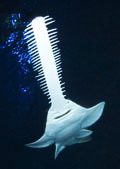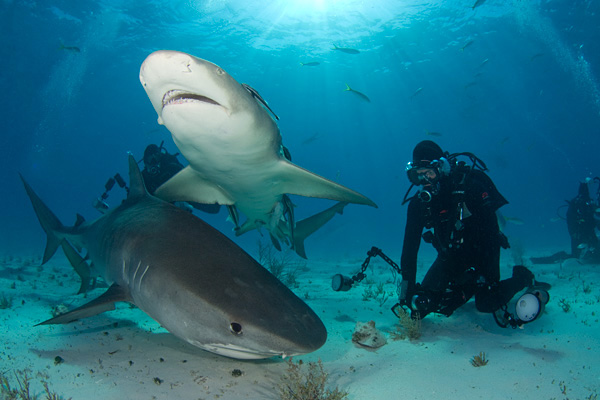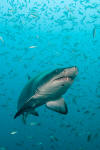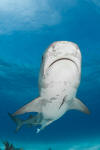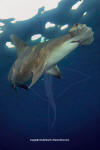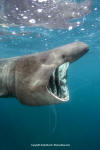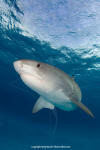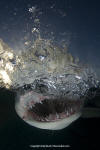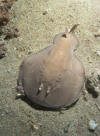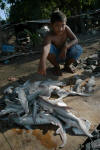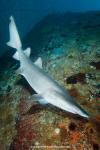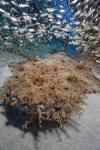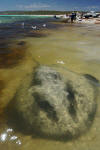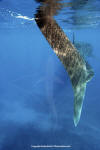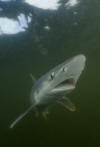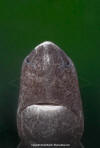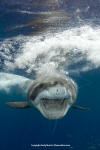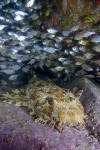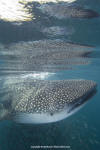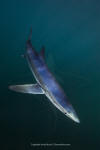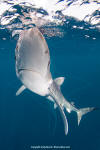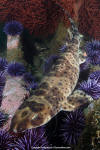| DAILY SHARK PICTURE |
|
Unless I'm at sea, climbing a mountain, trekking through the jungle, marooned on a deserted island, piloting a submarine (my other job), stuck on a plane, hiding from angry shark finners (not that unlikely), in a coma (been there, done that), in jail or just plain dead... this page will contain a brand new shark or ray picture (and caption) everyday (or two). Enjoy!
|
|
Tiger Shark 486 This pic is from our last photo workshop at Tiger Beach. This is Simon Ager looking for an interesting perspective of a tiger and a lemon. He was shooting with a tiny G11 camera which is an amazing point and shoot machine that captures pin sharp RAW files. It made me wonder if my monstrous 'state of th art' DSLR was about to become obsolete. Simon came home with some great pics!
Join our next Tiger Beach Shark Photography Workshop April 2-8 2011
Andy Murch is a Shark Photographer, outspoken Conservationist, Freelance Photojournalist, and the Creator of Elasmodiver.com
LOTS MORE SHARK PICTURES ELASMODIVER HOME
SAVE THE SHARKS, SAVE THE WORLD
Previous Daily Shark Pics:
|
|
Barndoor Skate 048 These barndoor skates were caught as bycatch in a deep sea squid trawl. When we released them at the beach they swam around and then settled on top of each other. They had been through a lot by the time they finally made it back into the sea and it occurred to me that they may have felt some kind of comfort by being in close proximity to each other. It is a very unskatelike thing to do from the skates I have seen previously. Coincidence? Or an instinctual reaction to stress? Just one more question that we'll probably never answer. |
|
Lemon Shark 510 You can swim but you can't hide. A lemon shark slides past a soft coral head at Tiger Beach. |
|
Sandtiger Shark 029 Depending where you are from, you may know Carcharius taurus as the sandtiger shark (North America), the ragged tooth shark (South Africa) or the grey nurse shark (Australia). Blessed with a beefy frame, beady eyes and a jaw overflowing with wickedly curled teeth, it is a living caricature of everything frightening about sharks. Its habit of devouring its siblings while still in the womb (inter-uterine cannibalism) has done nothing to improve its reputation. In reality it is a timid, fish eating shark that shies away from contact with divers if they make eye contact, swim too fast or simply make too much noise. It has been four years since I shot this portrait above the wreck of The Spar in North Carolina and I'm looking forward to heading back this August during Sharkfest for another crack at the perfect sandtiger image. No chum is used on NC dives so the encounters are purely up to the sharks. Lets hope they're feeling particularly friendly the weekend we are there! |
|
Lemon Shark 578 This is a shot of Photographer Nathan Meadows working the reef to get more dynamic shots of a lemon shark at Tiger Beach. Nate came home with some spectacular images. |
|
Lemon Shark 515 Every year that I go to Tiger Beach the lemons have a few more remoras in their entourage. There is a good chance that their annoying escorts are probably there because we have made the pickings at TB so plentiful. What may amount to just a few scraps to a large shark is a rare feast for a remora. Is it a bad thing? There are worse ways to interfere with nature than bolstering the remora population - like shark fishing. This female lemon has a nasty looking growth on the side of her jaw which is probably the result of a hook that was lodged there. |
|
Tiger Shark 475 The reason Tiger Sharks always lose at 'Hide and Seek'.
|
|
Lemon Shark 511 After five trips to Tiger Beach it was time to look for some new angles. TB has plenty of sharks but it doesn't have that much reef structure so we spent a lot of time working in the sea fans looking for features that the sharks could swim through. |
|
Tiger Shark 436 I have just returned from a week long shark photography workshop at Tiger Beach. The image opportunities were so good that I'm dedicating the next week or two's daily shark pictures to some of the highlights from that trip. This is the tiger that stayed around all day every day. I guess some sharks just like getting their pictures taken. |
|
Lesser Spotted Catshark 023 Six or seven years ago I was in the UK shooting basking sharks. While I was there, I kept hearing about the little catsharks that could be found all over the shallows so after I'd finished the basker shoot I got the operator to take me into a river mouth where I could go hunting. It wasn't easy because I had a big animal lens on my camera but eventually I found one that was relaxed enough to let me get really close for this shot. They tell me that sometimes lesser spotted catsharks are so docile that you can pick them up. I didn't find any like that so I have to go back just to see that side of their personality. I probably won't be in the UK again until 2012. I'll bring the right lenses this time and these little guys will be at the top of my shooting list. |
|
Banded Wobbegong 036 This pic has been around the block a few times but its still one of my favorites. It immediately takes me back to Fish Rock which I think is one of the best dives on the planet. But then again I haven't dove everywhere... yet!
|
|
Blacknose Shark 012 Blacknose sharks are born with a distinct black smudge on the very tip of their nose. By the time they reach adulthood (like this meter long female) the smudge has usually faded to an indistinct shadow. I shot this pic on my first trip to St Maarten. The owners of Dive Safaris invited me to shoot their Caribbean Reef Shark Feed that they believed was also attended by sharpnose sharks. At first I wasn't sure what I was looking at but eventually even without the black smudge I figured it out. Apparently, the little sharks were regular visitors but shortly after that shoot the blacknoses left and never returned. |
|
Little Skate 010 I shot this little skate off Rockport Beach on the Cape Ann Peninsula, Massachusetts. Next week I'm heading back to New England to nail down some more north eastern elasmos for the Predators in Peril Initiative. Its the beginning of a 6 week trip to photograph as many east coast species as possible while they're still abundant enough to find. |
|
Great Hammerhead Shark 013 It's been a long time since I saw a great hammerhead in the wild. I shot this one when I was out with Jim Abernathy on my first Tiger Beach trip 6 or more years ago. I've shot a lot of different sharks since then but there's nothing quite like sharing the ocean with a big hammerhead. The Tiger Beach Photo Workshop is less than three weeks off. Will there be hammers?!... Lets hope so but either way, there will be LOTS of sharks. |
|
Sandtiger Shark Juvenile 001 Most divers that come to North Carolina would like to see sandtiger sharks and the bigger the better. The sharks aren't guaranteed but they're usually pretty thick on the ground. Considering how many sandtigers there are, you would think that there would be plenty of juveniles too but this 3ft pup is the only one I've ever seen. It was swimming along the bottom, twisting sideways every now and then to scrape its flanks on the rough stony substrate. |
|
Porbeagle Shark 030 Yesterday, on the second attempt, the porbeagle shark Lamna nasus was finally added to appendix II of the Convention on International Trade in Endangered Species of Wild Fauna and Flora. All the other shark species were turned down but it is still a cause for celebration. Fishing of a key shark species will now be far less lucrative in many areas. One important battle won in the war to save our sharks. Bravo to all those that played a part! |
|
Blue Shark 250 Her is the answer to the question that I posed as part of the caption for the last daily shark picture; strangely enough, blue sharks possess papillose gill rakers that can be used to capture krill and other tiny organisms.
|
|
Basking Shark 012 If I told you that there are four species of sharks that eat plankton that would probably leave a few of you scratching your heads. It is common knowledge among shark fanatics that whale sharks and basking sharks live primarily on plankton. Many of you probably know that megamouth sharks also eat a lot of plankton although they are definitely more omnivorous. Does anyone know what the fourth shark might be??? Join the discussion on Facebook to find out the answer or wait for the next shark picture of the day. |
|
Smooth Hammerhead 032 Smooth hammerheads are very, very shy. Most hammerheads are. Probably the most illusive hammer of all is the winghead shark which lives in the Indian Ocean and Northern Australia. It has a crazy looking swept back hammer that is half the length of its body. No one has ever photographed one underwater. I am on a mission to change that. I am not sure how yet but I'll find one sooner or later. Wingheads are threatened in much of their range so the images will be very useful for conservation campaigns but I'd be lying if I said that was the only reason. Truth is; its an obsession. |
|
Whitespotted Shovelnose Ray 010 Whitespotted shovelnose rays are sometimes called shark rays because of their obvious shark-like dorsal and caudal fins. However, they are unquestionably rays. This species lives in Australia and the Indian Ocean but I nailed this shot in an aquarium in the US. Next trip to Oz I'll be chasing wild ones - I know exactly where to find them! |
|
Tiger Shark 054 Its a month away from Tiger Beach. Will the weather hold? Will the sharks show up? Will everyone get the shots they are after? Will we see anything special like the albino hammer that Joe Romeiro saw in February? Will the boat sink? Will we all come back safely... Life was so much simpler when I was just a Shark Photographer.
|
|
Spiny Dogfish 062 This rushed snapshot of a spiny dogfish tells an interesting tale. Its right side is covered in sucker marks; clear evidence that this little shark recently escaped the tentacles of a Giant Pacific Octopus. This isn't the first time I've seen a GPO praying on a mud shark. I once found an octo that refused to swim away from the reef that it was perched on because it was guarding a half eaten dogfish. |
|
Lesser Electric Ray 068 When people talk about sharks being overfished, one of the leading examples is the Oceanic Whitetip Shark population in the Gulf of Mexico which has been depleted by a whopping 98%. Few people realize that other species of elasmos such as the lesser electric ray (Narcine bancroftii) are in just as dire straits. This info comes straight from the IUCN Red List: "While specific catch data are lacking over most of the species' range, declines to 2% of its baseline abundance in 1972 have been demonstrated in the Northern Gulf of Mexico. Shrimp trawl fishing is intense in that area" The lesson is simple; trawling has to stop. |
|
Big Skate 001 The scruffy looking lettuce kelp that this big skate is sitting on is typical of this particular area. I won't call it a dive site because no one except a total elasmo-fanatic would dream of diving there. Getting this image involved poking around in freezing cold water for many late summer afternoons off a deserted black sand beach on the south side of Vancouver Island. Eventually I spotted this guy in the distance and I did my best to nail a couple of shots before it took off for safer pastures. For obvious reasons, few divers will accompany me if I plan to dive this area. As well as being devoid of other notable marine life it is also a good 20 minute kick from shore before you reach deep enough water to start hunting for skates. I'm planning on doing a whole lot more dives there in September 2010. Wanna come? |
|
Grey Nurse Shark 008 I arrived at Southwest Rocks in New South Wales a couple of weeks after what was being labeled 'the storm of the decade'. The waves were so big that a large tanker was rolling around on a beach and flooding was reeking havoc on many coastal communities. The water clarity around Fish Rock was pretty grim. On some days there were A LOT of grey nurse sharks vying for space in the shark gutters but the lack of viz made it impossible to shoot the whole group. Even so, this little huddle gives an idea of how many sharks there were floating around. |
|
Lemon Shark 334 For the record, the only way to get a shot like this is to dangle a fish right in front of the shark's mouth. This is a shark that is trying to grab a scrap before the feeder pulls it away. It is NOT a picture of a lemon shark attacking the camera. At Tiger Beach the lemon sharks constantly weave between the guests but unless a diver is actually holding a fish the sharks take very little interest. |
|
Coffin Ray 001 Among electric rays, Coffin rays are in a class of their own. Almost devoid of swimming skills, they carve out a living as ambush predators that disable passing fish by discharging a high voltage electric pulse. Also called numb rays, they can inflict a shock powerful enough leave an adult diver temporarily incapacitated. Fortunately, they usually want nothing to do with people. |
|
Blue Shark 111 Not all blue sharks are blue. Some, like this 5ft female that I shot off the coast of Southern California are very pale. Counter-shading is important among open ocean sharks to help them hunt without being seen from below. So, animals that lack pigment carry a serious disadvantage. |
|
Shortfin Mako Shark 365 This has to be the beefiest looking mako that I've ever shot. The shark's stubby appearance is really just the effect of it turning right in front of my fisheye lens. This particular shark was only about 6 or 7 feet long. As sharks mature to their full size (at least twice this length in makos) they generally get proportionately girthier in order to counteract their natural negative bouyancy. The extra width is mostly taken up by liver which is filled with oil. The oil is lighter than water so the sharks do not have to work so hard at swimming in order to avoid sinking. |
|
Lemon Shark 258 I wrote an article the other day about how difficult it is to decide which destination has the very best shark dive on the planet. It really depends on your interests but if your primary goal is to find outstanding photography opportunities with big predatory sharks then Tiger Beach will win hands down. I probably have enough good pics from my last trip to create an entire year of daily shark pictures. What other dive destinations can trump that? |
|
Hammerhead Foetuses 001 This is the other side of chasing rare sharks. A few years ago I went on an expedition to El Salvador to try to track down the mallethead shark which is a type of hammerhead that is rarely seen anymore. The trip was tough on many levels. At one point I spent time in a remote fishing village on an island named Tesajera. The local fishermen came home with a very large hammerhead and cut these pups out of its uteri. The foetuses were destined for cerviche (seafood salad). How do you tell people with very little money that they shouldn't do what they've done for generations? After a while I just went through the motions - don't think, just shoot. Record what you can, smile and make friends. Nothing you can say will help these sharks right now. The images are important and maybe on the next trip when they trust you more you can start to discuss the issues. |
|
Sandtiger Shark 024 I think I took this sandtiger shark picture on the wreck of the Spar but not being a "wreck diver" the big rusty metal boats tend to merge into one all encompassing shark diving memory in my head. The shallow sand bars off the North Carolina coast are very treacherous. The Outer Banks jut way out into the wild Atlantic where immense storms can lift a boat high into the air and then pull it back down and break its back on the sand. Many ships and sailors have met their demise on the Diamond Shoals inadvertently providing hundreds of micro-habitats that sandtigers eventually colonize. |
|
Whale Shark 214 The white patch on this whale sharks lower lip is comprised of many rows of tiny rasp-like teeth. The teeth are vestigial and have no apparent value as feeding tools. Its possible that whale sharks use them like Velcro to hold on with while mating. |
|
Green Sawfish 058 I've never seen a sawfish in the wild and that's not likely to change any time soon because sawfish are on their way out. Their impressive rostrums which they use to slash into schools of fish and possibly to uncover animals in the sand, are proving to be their downfall. Sawfish regularly get tangled in discarded or lost fishing nets where they die a slow death. When tangled in working nets, the fishermen often cut off their saws in order to avoid injury while trying to extricate them. It is illegal to collect the saws in most countries but they still find their way onto the black market where they end up in curio shops. |
|
This is the first wobbegong I ever saw. I had just enough time to dial in my exposure and nail this shot before it took off for somewhere more peaceful. Six years on, I have images of six species of wobbies on elasmodiver. Hopefully, I'll continue to shoot one a year. Once I've shot the three new ones that were recently described from Western Australia, I will have to head to Japan to complete the set. Japan has a similar mix of tropical and temperate zones so it is not surprising that wobbegongs managed to settle there at some point. |
|
Spotted Ratfish 016 Ghost sharks also known as ratfish or chimeras are not true sharks but they do have a lot if similarities and they may be descended from some of the early shark prototypes. The males have claspers and just like male sharks. Unlike sharks, they also have little Velcro covered appendage in the middle of their forehead that they use to hold onto the female with. |
|
Sandtiger Shark 057 Sandtigers are often used on the covers of books because they look so ferocious. But not this guy. Who could possibly be afraid of a goofy lovable sandtiger shark like this one?
|
|
Thorntail Stingray 007 This enormous thorntail stingray was hanging around the beach waiting for scraps from the fish cleaning table. It was approaching two meters wide and very friendly. While I was composing this shot, its identical twin sister was slowly sucking my foot into its mouth. |
|
Cobbler Wobbegong 035 Its not surprising they're still discovering wobbegong species in Australia. This 4ft long cobbler wobbie is bright orange against a pink reef and its still really hard to see.
|
|
Spiny Dogfish 096 Spiny dogs have one of the longest gestations of any living vertebrates. They can remain pregnant for more than two years before their young are ready to be born. They also mature very slowly and may not be ready to mate for 20 years. Fishermen say there are too many dogfish on the eastern seaboard and they want the dogfish quotas increased. Dogfish were so heavily fished on the west coast and in European waters over the last few decades that they still haven't bounced back so lets hope that any plans to deal with the latest dogfish problem are drawn up by scientists that pay attention to history. |
|
Tiger Shark 160 Shhhh! She's had a long day.
I guess I should point out that this is not a sleeping tiger shark. I took this image right as the tiger pushed up against my dome port and reflexively rolled her eye to protect it from harm. You can just about see where her snout is flattened against the glass. Sharks don't sleep in the same sense that we do but there is evidence to suggest that they may 'switch off' while swimming slowly along. Cute pic though, huh? |
|
Lemon Shark 385 For the most part, lemon sharks are very careful, intelligent creatures. To get this shot at Tiger Beach and many like it, I was holding position about a meter under water right where the crew were throwing in chunks of fish. The sharks constantly had to navigate around me while accelerating at top speed in order to beat their siblings to the bait. A lot of the time they were quite agitated, bumping into and sliding over one another but they never once made contact with me. It would have been easy to bowl me over but at some fundamental level the sharks realized that they needed to avoid me. As soon as I grabbed a piece of bait that all changed. |
|
Chain Catshark 016 Chain catsharks live from about 250ft downwards. That puts them in the category of 'tec sharks'. To shoot tec sharks you don't need a submersible or an ROV but they're too deep to expect to see one on a Sunday afternoon shore dive. Actually that's exactly what we did but we took our own shark which is a whole other story. Usually getting shots of sharks like this involves strapping on a set of double tanks after completing a lengthy course in decompression theory and then selling your car so that you can afford the helium or other exotic gases that you need to visit tec depths. Now you begin to see why there aren't many pics of tec sharks kicking around. |
|
Great White Shark 227 These are the kind of conditions you get at Guadalupe Island. If you're looking for opportunities to photograph or view great white sharks up close (really close) in bottomless, sapphire blue water, why would you go anywhere else? I sound like I'm selling tours but I promise I'm not on commission. I just can't get over how perfect Guadalupe is for shark shooters. |
|
|
|
Tiger Shark 057 If you've ever wondered why you never see pictures of beach chairs and sun umbrellas at Tiger Beach its because Tiger Beach isn't a beach at all. It is a shallow sandy lump that rises to within 20ft of the surface about a 2 hour boat ride from West End. Back in 2001 Jim Abernathy was chumming all over the Bahamas. He was looking for the sharkiest place in the whole island chain to take divers to and he soon realized that this was the sweet spot for tiger shark encounters. Jim coined the name Tiger Beach and the rest as they say is history. |
|
Smooth Hammerhead Shark 007 This is one of the very few smooth hammerhead shark pictures in existence. Too shy to approach divers of their own volition, this animal was captured by longline fishermen in La Paz, Baja California. La Paz Bay is devoid of reefs and generally too murky to interest divers. However it is a nursery ground for young smooth and scalloped hammerheads which made it worth the trip to a remote fishing camp 20kms north of town even though I destroyed my suspension in the process. |
|
Whale Shark 075 This is a shot that everyone that has tried to shoot whale sharks has in their portfolio. Invariably, when you're snorkeling or diving with whale sharks you start in front of the shark. Either the boat drops you off or you inadvertently intersect a shark underwater. Either way, the shark keeps going while you frantically kick to stay in position. Whale sharks don't particularly enjoy having divers buzzing in front of their faces so they speed up just enough to outpace you. Sometimes it happens in an instant and sometimes you manage a valiant spurt of energy and spend five minutes or more losing ground inch by inch. Inevitably, you end up avoiding the tail and blown away by the sheer bulk and majesty of the animal you turn and fire a parting shot of its enormous caudal fin then hang prostrate in the water while your heart slowly quiets. |
|
Great White Shark 234 Shark photography is like life. The white sharks at Guadalupe can be challenging subjects even though the water is generally crystal clear. Sometimes they like to keep their distance which makes it hard to really bring out their contrasting colors. Sometimes the boat swings and you spend all day with the sun in your eyes or bubbles from the exhaust wreck every shot. My advice is the same as it is for every other diving location. Stay in the water and keep trying. If the sharks don't want to play or there is lots of wave action or the light is in the wrong direction, you may not get the shot. Sit on deck whining and I guarantee you wont. Nothing ventured; nothing gained. |
|
Atlantic sharpnose shark 050 This little Atlantic sharpnose shark is one of many thousands that migrate into the Mississippi Sound each summer. The sound is an inhospitable place with low oxygen levels, low salt levels and not much food. There are also big bulls sharks and blacktips swimming around that are very partial to sharpnose sharks. Even so, the sound is still a much safer place for a 2 to 3 foot shark to hang out than the deep sharky waters of the greater Gulf of Mexico. If I was reincarnated as a shark I wouldn't want to be a sharpnose.
|
|
Bull Sharks 027 I got sucked into an argument on scubaboard the other day. Some divers that had recently returned from Playa Del Carmen were talking about how awesome it was being circled by bull sharks. There was no one feeding the sharks and it was their opinion that 1, it wasn't necessary and 2, anyone who did, was an irresponsible fool. I tried to point out that the only reason that they had such a cool encounter was that they were diving in an area where other dive operators feed sharks every day. The sharks approach divers to see if they'll get fed. This concept met with disbelief, they were happier to believe that the bull sharks had circled them out of curiosity or because they naturally swim around close to people. Funny that bull sharks only do that in Playa where they get fed everyday. Some people are so anti shark feeding that they just won't listen to reason. |
|
Greenland Shark 114 This greenland shark picture reminds of the JAWS poster but how could anyone be afraid of such a goofy looking shark? No offence to puny little great whites but these guys are the largest predatory sharks in the world and they sometimes swallow caribou. |
|
Tiger Shark 315 I don't know my tigers. Some people that visit Tiger Beach more regularly than me have names for every tiger shark that swims by. There are some that are famous for their gentle disposition and others that are partial to diver's cameras. One named Emma even has her own fan page. They're all beautiful animals and even if they are not really there to hang out with the monkeys, at least they're amiable enough to let us take photos while they're looking for a snack. |
|
Blue Shark 040 This was one of the first blue sharks I ever saw. Still one of my favorite pics. |
|
Port Jackson Shark 004 Port Jackson sharks are members of the bullhead shark family. The juveniles like the one in this image, have a beautiful dark bridle over their head and shoulders which fades as they mature. When they're young they hang out in the sea grass so the counter shading works well. The adults live under ledges where darker, drabber coloration makes more sense. |
|
Common Angel Shark 010 This casual looking shot of Claire swimming next to a common angel shark was actually a mad dash followed by a hypoxic bout of breath holding while I snapped away before the shark sped up disappeared over the horizon. If you look carefully you can see the rooster tail of sand that she has kicked up behind her in order to get into position. Its all about perception. |
|
Great White Shark 208 So, there I was at Guadalupe Island, hanging out of the cage as far as my umbilical would allow. I was busy waiting for the money shot and I'm sad to say that the most profitable shots are still the scary ones. The beauty and grace of sharks are still somewhat lost on the general public. While pursuing a hang bait, this particular white shark finally swam straight towards the cage, mouth gaping. I framed the shot hoping for the best and presto; another goofy shot of a grinning white shark saying "Hey, let's play". The moral of the story is that unless you get the perfect angle great white sharks just aren't that scary but they're SO cute!
|
|
Spiny Dogfish 054 One of the most controversial shark species is the spiny dogfish. A few years ago, researchers on the US east coast suggested that female spiny dogfish were getting heavily over fished. Like many sharks, dogfish segregate by sex for much of their time so it makes sense that just the females could be depleted. Strict quotas for dogfish were put in place to protect the remaining stocks but if fishermen can be believed, this has led to a plague of male spiny dogfish which is depleting other fish stocks. The fishermen say that the answer is to cull the males but removing more sharks is a band aid solution at best. This may be a radical view but a moratorium on all fishing on the east coast until all the fish stocks find a natural balance is the only real solution. |
|
Banded Wobbegong 164 When I first started shooting wobbegongs I would sit in front of them for many minutes getting just the right angle and playing with exposures. Every now and then one would stretch its mouth wide open. I thought it was the shark equivalent of a yawn until I learned about threat displays. In retrospect I'm lucky one didn't latch onto my head which was often only a few inches in front of its face. |
|
Banded Wobbegong 039 This banded wobbie was shot at Fish Rock in New South Wales. He was good enough to sit and pose while I took a whole slough of images. He was there every day in the same spot patiently waiting for a fish to wander into his strike zone.
|
|
Dead Pacific Sharpnose Sharks 004 In a twisted way, this is actually quite a good shot. A solid blue border surrounding a well arranged heap of sharks. It reminds me of a dark version of one of those still life paintings of fruit in a bowl. Sitting on the panga while they hauled in their longlines was a tough gig. 1400 hooks. Four km of lines. Seven tiny sharks. One empty ocean. Not such a pretty picture. Support ocean conservation. |
|
Bluntnose Sixgill Shark 001 This snapshot was the culmination of about 200 dives around Vancouver Island. While my diving buddies happily snapped away at nudibranchs, octos and rockfish, I floated around patiently with a wide angle lens and no subject. On my last dive of the summer back in 2005 (I think) I was diving on my own at 100ft when this guy swam up behind me. I managed to fire 4 hurried shots before he descended back into the black. I was ecstatic. I had finally encountered my first sixgill - it was worth every freezing cold deco stop. |
|
Lemon Shark 227 Today's shark pic goes out to all those people that added their support to stop the lemon shark fishery in Florida State waters. News quote: "The Florida Fish and Wildlife Conservation Commission (FWC) on Thursday approved a series of rules to enhance its long-standing policy to protect stressed shark populations in Florida waters" One for the sharks. Well done everyone! |
|
Blind Shark 023 Blind sharks are quite common along the east coast of Australia. Normally they only forage at night but if you're lucky you can occasionally find one hunting at dusk when there's still enough light to snap a few pics. Contrary to what their name suggests, blind sharks have impeccable vision but they have a habit of closing their eyes when they are pulled from the water by fishermen. So would I. |
|
Whale shark 106 The visibility wasn't great in Holbox when I captured this whale shark image but the water was really calm which allowed me to take advantage of the reflections. Vertical whale shark images are hard to find which is probably why this one has been published quite a few times. |
|
Common Stingray 013 Its time to get you thinking about what a shark really is. 200 million years ago sharks were busy filling every niche that they could find. Possibly through selective reproduction (no offence meant to other beliefs) some sharks got more and more streamlined and became the fierce predators that we have today. Some developed spikes on their fins, some grew enormous and learned how to sift plankton like the great whales, others slowly flattened to adapt to a sedentary life on the sea floor. Their gills moved under their disc shaped torsos, their spiracles grew bigger to help pump water over their gills while they were laying on the sand, and some of their dermal denticles lengthened into defensive tail stings. Strangely, some narrowminded taxonomists decided that they were so specialized that they could not be considered sharks anymore but if you think about it, that's ridiculous. This cute little common stingray is one of about 1200 species of sharks and they all need protecting, not just the ones with big teeth. |
|
Blue Shark 435 Blue sharks have an iridescent quality to their skin that mesmerizes me whenever I'm around them. I wish I could show you the hi res image without all the graininess. Early next year I am planning to have an exhibition of my favorite shark images somewhere in the Pacific North West. This will be one of the archival prints. |
|
Banded Wobbegong 003 Its easy to see how wobbies can be mistaken for rocks. This banded wobbegong may look pretty conspicuous resting on grey sand but if you're not paying attention it soon becomes just another boulder. And if you're a small fish that hasn't figured out that some rocks have teeth, then life can be... short. |
|
Gulf Smoothhound Shark 008 This image was taken next to an oil rig right at the edge of the continental shelf while I was on a week long expedition aboard a commercial fishing boat in the Gulf of Mexico. Initially I thought that it was a dusky smoothhound which is hard to photograph but common along the eastern seaboard. I sent the pics to a smoothhound expert after the shark tour and she told me that it was definitely a Gulf of Mexico Smoothhound which is only found in two small pockets in the northern gulf. I was thrilled. One more never before photographed shark for Elasmodiver! |
|
Blue Shark 269 This was a very bold blue shark. He was only about 5ft long but he was happy to swim straight up to me and nose my dome port. In this picture his snout is about an inch in front of my camera which is why it looks like his head is so enormous compared to the rest of his body. |
|
Tassled Wobbegong 007 This is one of the first tassled wobbegongs I ever saw. It was under the navy pier at Exmouth in Western Australia with many others. Interestingly, at the time, Exmouth was beyond the known range of the tassled wobby so when I showed this image to the late Aiden Martin, he decided to write a paper about it. Sadly, Aiden passed away unexpectedly before the paper was written which was a big loss for science, sharks and all his friends like me. This image once ended up on a set of playing cards. Wobbegongs are still my all time favorite sharks. |
|
CALIFORNIA SWELL SHARK 016 This is a popular swell shark image that has appeared in a couple of books. I took it at Refugio Beach near Santa Barbara. I know that sharks have tough denticle covered skin but when I look at this little guy I wonder how he can possibly be comfortable perched on a bed of urchins. |
|
SHORTFIN MAKO SHARK 352 This is a picture of a mako and me. It was shot mostly with natural light with the sun behind me. You can clearly see the shadow of my camera housing and strobes draped across the mako's body. |
|
30/11/09 Common Angel Shark 014 I followed this common angel shark around for about an hour before it would relax enough to let me snap an image from straight in front of it's mouth. This was shot on a very productive week in the Canary Islands. FYI, common angel shark's are anything but common these days. They have been almost completely eradicated from the North Sea by shrimp and other trawlers. |
|
This is my favorite Great White Shark picture from our trip to Guadalupe Island with Great White Adventures this summer. You may think its pretty easy to get close up shots of a great white shark when you're hiding in a cage. If you want to see a really cool customer, check out the sea lion casually swimming around in the background!
|
|
|
|
|
